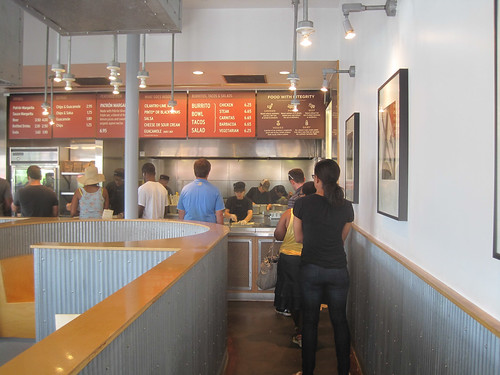Something funny happened to Chipotle Mexican Grill (CMG 0.43%) stock last Thursday. Shares jumped out of the gate after the company reported a strong sales jump in its earnings report that morning. Revenue surged 24.4% to $904.2 million on a whopping 13.4% jump in comparable sales, both numbers blowing expectations out of the water. Shares were up as much as 6.5% in the early morning but dipped during the company's conference call, finishing the session down 5.9%.
What happened? CFO Jack Hartung said the company would raise prices for the first time in three years to help it absorb higher food costs. In the quarter past, food costs grew 150 basis points to 34.5% due to rising beef, avocado, and cheese prices. Hartung said the burrito chain would raise prices by the mid-single digits, putting them in place nationwide by this summer.

Chipotle customers will have to spend a little more dough for a bite of its burritos.
Who's the owner here?
The investor reaction seemed odd as shares closed nearly 12% lower from their peak that day. Price increases are often greeted favorably by the market, especially because those additional cents go directly to the bottom line, meaning Chipotle's profit margin will almost certainly expand in its next earnings update. In Thursday's report, the bottom line was a weak spot as adjusted earnings per share increased only 12.3%, in part due to the additional food costs.
Perhaps the most recent example of a high-profile price increase in the market was Amazon.com's (AMZN 0.81%) decision to raise the annual fee for its Prime membership to $99 from $79 a month ago, the first price increase on the service since it debuted in 2005. You may think that Amazon's decision led to a sell-off, but shares actually ticked up 0.3% that day, even though Prime is seen as a loss leader that drives loyalty and greater usage for Amazon. Looking at it that way, a price increase for Prime is riskier than Chipotle's decision to ask consumers to shell out more for burritos.
Netflix (NFLX 2.51%) famously put its foot in its mouth with its price increase back in 2011. Shares tumbled on the debacle as Netflix attempted to split its streaming and DVD-by-mail services and raised prices 60% on the combined package. That was a much steeper hike than Chipotle is promising, however, as a 5% increase would be just $0.40 per burrito. When allowing for inflation, the price increase is really not an increase, as consumer prices have risen by 6.2% over the last three years.
We've been through this before
The best comparison to use for Chipotle's price increase would be the one it did itself three years ago. The burrito chain last raised menu prices in the summer of 2011, for much the same reasons it's doing so today, as higher food costs, specifically beef and avocados, had been cutting into profit margins. But the stock continued to gain, adding 40% over the next nine months until it hit a valuation-based sell-off. That price increase had no visible negative effect on its results in subsequent quarters, as the company saw same-store sales grow 11.3% in Q3 2011 while earnings per share increased 25%, slightly ahead of the quarter's sales increase, to $1.90. In the fourth quarter of 2011, figures were similar, with an 11.1% comparable-sales increase and a 23.1% increase in EPS. In addition, the U.S. economy is much stronger than it was three years ago, so consumers are more likely to be able to afford a price increase.
Too much of a good thing?
There may be one easy explanation for the stock's sell-off following the price increase announcement. Chipotle stock has been roaring lately, with shares peaking above $600 before a recent decline, and the 13% comps it just posted is especially impressive during a quarter when many retailers complained of poor traffic due to bad winter weather. Investors may simply be afraid that a price increase could jeopardize Chipotle's formula for success.
But based on the restaurant chain's past experience, those fears seem overblown. Rather than sending the stock down, investors should be pleased with the price increase, which is likely to beef up profits and bring down Chipotle's lofty P/E multiple.
If a 5% price increase went directly to the bottom line, the company would see operating income increase by a third, and operating margin jump by 400 basis points. Even if sales held flat, operating income would still go up by 27%. Management expects food costs to continue to increase this summer, which will take a bite out of the price hike, but the lesson remains the same: When a well-loved, high-quality brand decides to raise prices modestly for the first time in three years, that's good for profitability, not bad.





